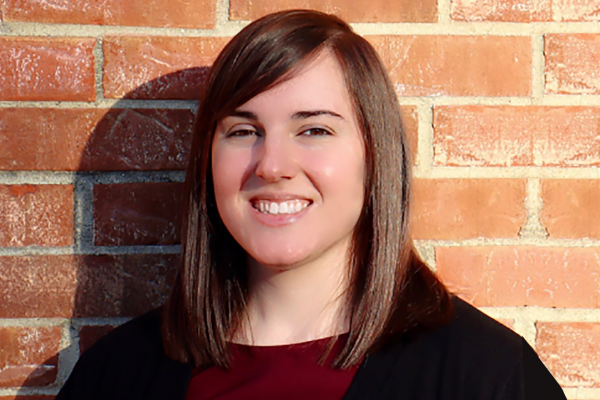Representation and Research: Greene Applies Pharmacology Expertise to Curing Cancer

Cancer researcher and pharmacology alum Jenna Greene hopes to improve representation of the deaf and hard of hearing as she looks ahead to medical school.
It was a passion for pathology that first led Jenna Greene to consider the online Master of Science in Translational Pharmacology. Her work as a laboratory technologist at The Ohio State University Comprehensive Cancer Center – Arthur G. James Cancer Hospital and Richard J. Solove Research Institute and a long-held dream of one day attending medical school made the online pharmacology degree program the perfect fit for her.
Led by expert faculty from the Colleges of Medicine and Pharmacy, the translational pharmacology program offers students the opportunity to complete a culminating project in conjunciton with a clinical research site. Greene's project – which centered on the treatment of acute myeloid leukemia – helped deepen her understanding of the drug development and clinical trial process, while allowing her the freedom to pursue her own research interests.
What sparked your interest in the pharmacology master's program?
I was working as a laboratory technologist on oncology clinical trials at Ohio State’s Comprehensive Cancer Center – James Cancer Hospital and Solove Research Institute, and the program was relevant to my daily work. We procure biological specimens for clinical trials in Phases I through III, and it was fascinating to see drugs receive FDA approval based on the clinical trials we processed the specimens for. The pharmacology program deepened my understanding of the drug development process, including the clinical trial process.
The pharmacology program deepened my understanding of the drug development process, including the clinical trial process.
Why was the program the right choice for you?
The result of the master’s program prompted me to think about working toward the old dream I had – obtaining a doctorate in medicine. My doing so would be a positive impact as I am deaf and hear with the aid of bilateral cochlear implants. I hope to improve the representation of the deaf and hard of hearing in the medical community and bring more awareness to improve healthcare outcomes.
What was the most valuable thing you gained from this program?
The program encouraged us to research our interests. I focused mostly on multikinase inhibitors in the treatment of acute myeloid leukemia (AML). I learned in depth about the pathology and about the treatments currently available and what future research is needed.
For my capstone project, I wrote a protocol studying the combination of two treatments for the treatment of AML that was not previously studied. I gained a wealth of knowledge and insight into all the time and effort required for protocol writing, as well as the collaboration required in the initiation and conduction of clinical trials.
I gained a wealth of knowledge and insight into all the time and effort required for protocol writing, as well as the collaboration required in the initiation and conduction of clinical trials.
What is your current role?
After working as a laboratory technologist for five years, I transitioned to my current role as a clinical research coordinator for the same team. The transition occurred at around the same time as my graduation from the pharmacology program. I provide feasibility and logistic input on new clinical trials that would be handled by the laboratory. I also create and update the instructions on the specimen collection and processing to align with the protocols.
What are your career goals? How did the pharmacology program help?
Pathology has always been the primary interest of mine, and the pharmacology program covered many diseases. I got to research AML through presentations, papers and my culminating capstone project. I also have interests in oncology. As for what’s next, right now I'm leaning toward pursuing medical school. After that, I want to achieve my goal of working in pathology or oncology.
